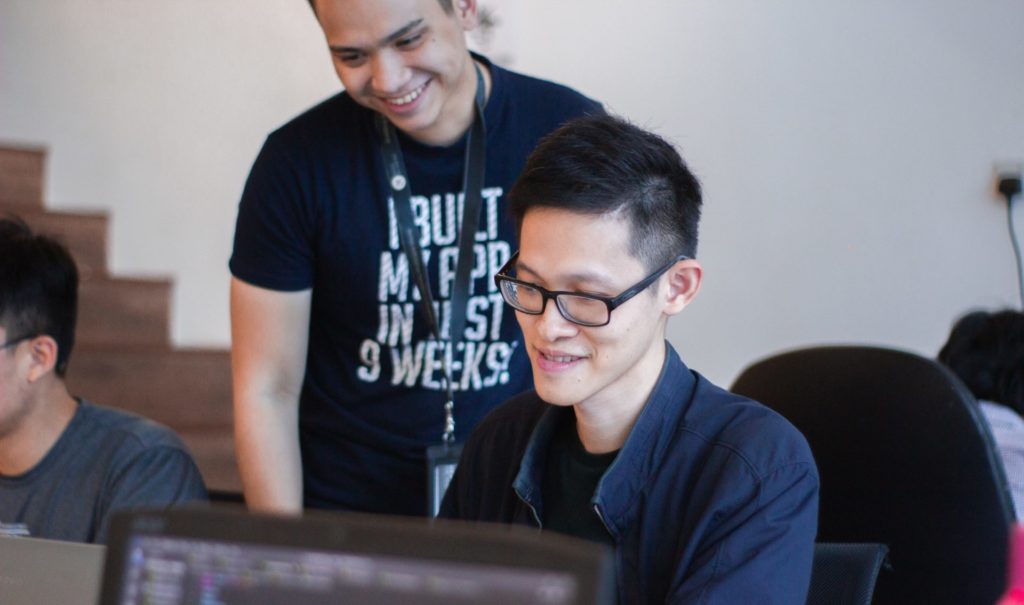Brad Krauskopf, CEO and Founder of Hub Australia, landed in coworking for the same reasons many members of the industry found it attractive: the variety, pace, innovation, and entrepreneurial opportunities. However, it wasn’t just creativity and good entrepreneurship that not only helped him build a scalable brand but also got Hub Australia recognized as the #5 best place to work in Australia (for companies under 100 employees) in 2019.
One of the secrets to building a sustainable, scalable coworking model with a healthy culture and great staff retention, Krauskopf said, is mentorship. He also cites a supportive, growth-oriented culture as one of the things (alongside hospitality and premium services) that differentiated Hub as a premium rather than midrange workspace, helping them not only attract high-end clients but also help their staff grow into new positions within the company and stay with them for the long term.
Although there is no one size fits all model for professional mentorship, Krauskopf did offer some guidelines from his experience for building a mentorship culture in your space.
-
Build a network of mentors.
Krauskopf explained that, for him, having a network of mentors has been key. While many people have a single mentor—whether in a formal sort of mentorship or a more informal one—the reality is that one person won’t have all the expertise and perspective you need.
“You need to be able to have many people from different walks of life and experiences that you can call on,” Krauskopf said.
One potential pitfall in looking for mentors—especially if you’re relying on one person—is that it can be too easy to rely on that mentor to make your decisions for you. The role of good mentors, Krauskopf explained, is for them to give you their advice and perspective—which will often conflict with advice from other mentors—in order to give you things to think about. In the end, you’re the one who has to make the decision.
Once you’ve built a good mentoring network for yourself—whether through professional contacts, organizational contents (such as those formed through the GWA), or even from contacts within your space, the key is to make sure you’re helping your employees develop those mentoring networks, too.
“That retains them in the organization,” Krauskopf said.
-
Make staff development a priority.
One of the major differences between Hub and the larger, chain-type coworking brands, Krauskopf said, is their focus on staff development—and it shows in their turnover rate.
While the average turnover rate at one of the larger chain brands is about six months, Krauskopf explained, their staff tend to stay for years, often moving either vertically or, increasingly, laterally within the company.
Although it would be great to have a magic formula for when and how much to focus on staff development, Krauskopf said it’s not that simple. Likely, figuring out how much of your time and resources should go toward staff development and how much needs to be focused on operations, especially during the startup phase, can be difficult. But magic formula or not, Krauskopf said it’s imperative to focus on attracting, developing, and retaining great staff from day one.
-
Communicate your mission.
The modern workplace—but especially businesses like coworking spaces—increasingly demand employees to be more connected to the workplace than they’ve ever been. If this is going to be your expectation of your employees, however, you have to help them connect to work as more than a job. It has to be helping them develop as people and feel a sense of purpose in their work.
For Hub, accomplishing this goal has resulted in a whole host of programs, including resources for professional development (including certifications), volunteer hours, impact groups, and other initiatives to help employees set and meet goals for their own growth and development.
“Everyone talks about community with coworking. In my experience, if you commit to doing it and give people the time and the culture, then it tends to be relatively easy to create,” Krauskopf said.
-
Give your team building time to grow.
Although you should work on team mentorship and development from day one, Krauskopf also said it’s important to give this part of your business time to grow, just like everything else. While you may not have the resources to give large bonuses or invest in large team events or incentive programs right away, you can and should work on smaller scale mentorship programs and team member recognition with an eye toward scalability.
Regular meetings (Hub does them every six weeks) for employees with their direct supervisor are a great place to start. These shouldn’t be evaluative or corrective meetings; rather, these meetings should be directed by the employee expressing where they see themselves and how they’re trying to grow, with their supervisor giving input on how to help the employee meet their own goals. Sometimes, Krauskopf said, this will mean that some of the meetings might look more like catching up over coffee, and that’s fine too.
-
Develop a good hiring process.
Krauskopf said one of the turning points for their team culture building was tailoring their hiring process to help both their team and potential hires get a better feel for the culture and mission of the company before the hire.
Krauskopf said that a team with a balanced skill set—who can mentor each other in useful ways—is important, especially in an industry that tends to attract younger employees. On a more immediately practicable level, Krauskopf also said they added several steps to their hiring process in order to give both the potential hire and the team a chance to fairly see how they would all work together, rather than making a decision based on one success or failure in an interview.
“Investing that time up front just saves so much time down the track,” he said.
-
Make training an ongoing activity.
In addition to working on their hiring process, Krauskopf also said they revamped their induction process as well. It’s important, he said, not just to train employees on day-to-day operations; you need to help them acclimate to the culture and values of the company as well—and that has to extend past the formal onboarding period.
In addition to their every-six-week meetings, Krauskopf said they instituted a daily check-in via Slack where team members share daily priorities, how they’re feeling for the day, something they learned yesterday, and something that worked well yesterday. Keeping an open culture of learning and connection is key to helping people feel connected to the people they work with—and thus more likely to stick with the company.
A Commitment to Culture
“I feel like we’ve completely…overturned our culture and grown it in a really great way over the space of two to three years. And that might sound like a long time…but we’ve been able to achieve more in the last two to three years than we had in the previous five,” Krauskopf said.
One of their more recent paths toward progress was working toward the “Great Places to Work” program. Krauskopf said he and the rest of the leadership for Hub had the “Great Places to Work” program requirements as part of their KPIs—and it paid off way faster than expected, with Hub being named one of the top five places to work in Australia in 2019 (for companies under 100 employees).
Hub, which started in 2011, also recently partnered with the City of Melbourne and RMIT Activator to launch The City of Melbourne Accelerator Program (CoM X), a 12-month pilot program for retail and hospitality start-ups. You can read more about Hub on their website.




